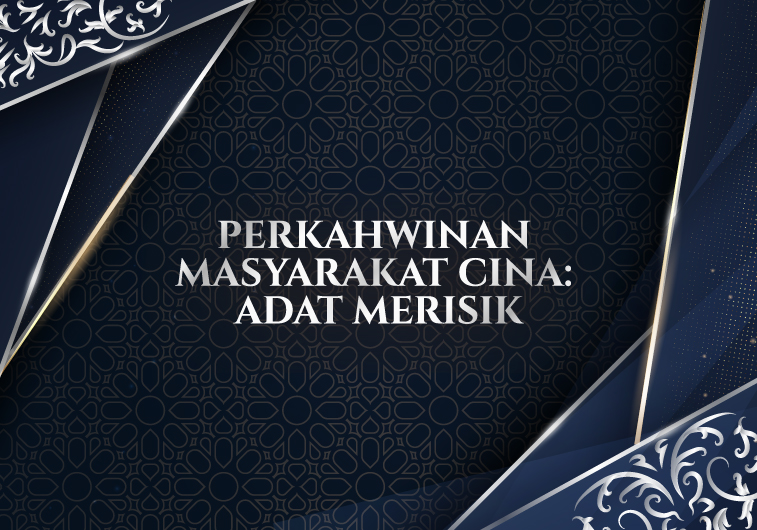ARTS AND CULTURE INFORMATION GATEWAY
Immerse yourself in the colorful world of art and culture! From traditional heritage to contemporary works, discover uniqueness that reflects the nation's identity and identity
ADAT RESAM DAN BUDAYA SEBELUM PERKAHWINAN MASYARAKAT CINA: ADAT MERISIK
Picture
1
Video
No record
Today's Visitor
5
Number of Visitors
874
Introduction and history
In Chinese society, marriage is considered an important starting point in a person's life. It is one of the main aspects of strengthening and maintaining the family institution, which clearly shows that lineage can be passed down from one generation to the next. The word for marriage in Chinese is 婚姻 (pinyin: hūn yīn). Originally, traditional Chinese marriages were often arranged by families interested in combining relationships.
In Confucian thought, marriage is considered a very important matter because it involves the union of two families and has an impact on society. According to Chinese cultural tradition, marriage between two individuals with the same surname is considered incest. From the point of view of Confucian families, marriage connects families with different surnames and ensures the continuity of the paternal clan. Therefore, the benefits and drawbacks of a marriage affect the entire family, not just the couple involved. From a social perspective, husband and wife are seen as the basic unit of Chinese society.
The structure of customs before marriage in Chinese society is
Surveying Custom
Marriage Ceremony
Engagement Custom
The role and function of surveying customs is to find out the background of the desired girl. In Chinese society, great attention is paid to things like the girl's name and lineage, as well as personality, character, and behavior. At this surveying stage, the discussion usually involves general matters such as the woman's family background and lineage, as it is the first step in the marriage process.
Basically, during the custom of surveying in Chinese weddings, men and women usually wear polite and modest clothes such as samfoo or cheongsam, with a choice of colors such as red, gold, and pastels that symbolize luck and modesty, in accordance with the formal atmosphere and the tradition of respecting the family.
In the modern era, when the surveying customs of Chinese weddings change, although some couples choose traditional clothes such as samfoo and cheongsam, many also combine modern elements such as Western formal clothes but still maintain the value of modesty and choose symbolic colors such as red and gold that symbolize luck, in line with tradition and current lifestyle changes.
The surveying is done to make sure the desired girl is not yet owned, which is the responsibility of the male parents. At this stage, the boy's parents will ask acquaintances or friends who know the girl's family. If there is an agreement, the man will give a split rattan ring as a sign, and if the woman agrees, a date for the engagement ceremony will be set. Some Chinese people prefer to have this discussion in a restaurant with relatives. This tradition of eating together is very important because it helps strengthen the relationship between the two families.
Reference Source
Bahan Bacaan:
Alisya Mazni Binti Putri Wirdany Elvyna Mazlan Binti Idi Sopan, Nurnisa Dalili Binti Chung Ee Xuang Ridwan Taufik, Nur Ain Binti A. Rahman, Nurain Najiha Binti Zainurin, Tan An Qi Muhamad Yusof Bin Alam, Nasuha Binti Zainudin Muhammad Adam Rosyeed Bin Mohd Fadzli. (20232). Adat Perkahwinan Masyarakat. Majalah Adat Perkahwinan Masyarakat Cina. Cina.https://online.anyflip.com/qmrsk/eqdf/mobile/
Nurmaizatulakma Matdam. (2014). Adat Perkahwinan Dalam Masyarakat Cina Kajian Kes Di Kelantan. Jabatan Pengajian Asia Timur, Fakulti Sastera dan Sains Sosial, Universiti Malaya, 2013/2014.
Zuraiha Binti Mohd Zain Noraini Binti Sulaiman Siti Aishah Binti Othman.Adat Resam Masyarakat Malaysia - Upk Ptsb. Politeknik Tuanku Sultanah Bahiyah
Tokoh (jika ada temu bual tokoh) - Tiada -
Location
State JKKN Contact Information
Ahmad Zaimy bin Mohd Yusoff
Cultural Officer
Jabatan Kebudayaan dan Kesenian Negara, Selangor
Tingkat 6, Menara Korporat,
Kompleks IDCC Shah Alam
Jalan Pahat L 15/L, Seksyen 15
40200 Shah Alam,
SELANGOR DARUL EHSAN
03-5543 1654 /1763







